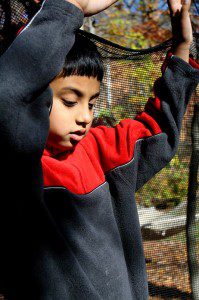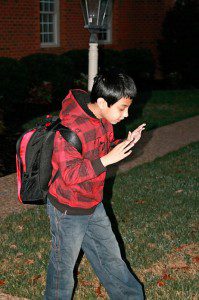 When the phone rang at 1:25 p.m. yesterday, I knew who it was before I picked it up: Lil D’s teacher calling me to come get him because he was too worked up (or potentially on the verge of a meltdown, or coming off a meltdown) to ride the bus.
When the phone rang at 1:25 p.m. yesterday, I knew who it was before I picked it up: Lil D’s teacher calling me to come get him because he was too worked up (or potentially on the verge of a meltdown, or coming off a meltdown) to ride the bus.
I’m prepared for this. I’ve let go of so many “norms” for Lil D these past months that the new autism norm in our house (and isn’t that an oxymoron?) is sadly quite minimalistic.
We’ve let go of so many years-old programs and expectations and demands of Lil D that it’s like my mom-in-law’s catchphrase, saath khoon maaf (which literally means the seven bloods are forgiven, and metaphorically means that all rules are forgiven), reigns supreme here.
Dinnertime rules — sit at the table until you are done eating, no taking bites of food while running around, say “all done” when you are finished – are suspended. Basic daily teaching lessons of dressing, bathing, clean-up — all out the window.
To be clear, I am still verbally instructing him and encouraging him to do for himself, but my tough, “you’re going to do it even if you don’t want to” ABA approach is on hiatus.
At school, 95 percent of his teachers time are spent on behavior management, barely any work is being done on the goals of his IEP (individualized education plan). With his home therapists, the carefully discussed and written community-based instruction, self-care, and academic programs are barely crawling along.
This is all because of Lil D’s past few months of hugely escalated meltdowns and self-injurious behavior. We — his teachers, therapists, and myself — struggle with the idea that by asking him to do the bare minimum, are we reinforcing all these behaviors? Or, until we figure out the medical reason (if there is one) or psychiatric reason for what’s been going on, is he just physically unable to learn and work the way he used to?
Underneath It All, He is There
I worry about how withdrawn Lil D has become, too. Social interactions, making friends, socially appropriate behavior – these are difficulties most autistics face, whether on the severe end of the spectrum or high functioning, or if the person is an “Aspie” (nickname for Asperger’s Syndrome). Over the years, we’ve come up with a balance of how we encourage and insist that Lil D “be there” with us, whether physically present where his family is, or interacting with us, and when he’s allowed his downtime.
I figure it’s that way with neurotypical kids as well. I mean, what “normal” 11-year-old boy is expected to spend all his time outside of school with his family? Come on, kids that age want alone time, time to do what they want — Lil D is no different, even if that time is spent burrowed under the covers of his bed, or stimming on his spinning beads.
At school, it’s no different. He is usually encouraged to socially interact through specific IEP programs (like his “lunch bunch,” where he eats a few times a week with different groups of fifth grade boys or girls and plays games with them) and through casual encounters in the hallway, during recess, or during music or art class, where he engages with his typically-developing peers.
All this has been severely affected as well by the problems he’s been having. More than ever, he just doesn’t want to interact with anyone. Its too painful for him. And, in fact, his therapists, teachers, and I have all noticed that it seems like he is becoming aware of how different he is than the kids around him. And that breaks my heart.
When it became evident to us (his parents) how severe his autism was, part of us thought, well, at least he’ll hopefully never realize how different he is. But I’ve learned that underneath all those autistic traits and problems, he is there. He really is. There are such moments of clarity with him, moments when he looks in my eyes, and I see his painful struggle to try and tell me something.
Or, when his joy at something is so evident. Or, when he displays such heartfelt remorse when he lashes out at one of us — as soon as it happens, everything stops, and he looks at us, utterly sad and apologetic about what he did.
And so, it is clear that he is becoming aware, when he is around other kids, that he is really different, that he doesn’t know how to act like they act. It’s upsetting to him, making him withdraw more.
I was thinking about these things yesterday morning, when I dropped him off at school. We were late, and there were a few stragglers in the hall walking to class. Lil D was upset and crying when his teacher came to walk him to his classroom. I felt bad for him, thinking that I didn’t want the other kids to see him like that.
When the call came to come and pick him up, I wasn’t sure how he’d be. I walked to his classroom and picked him up. Whatever meltdown he had had was over by then, and he was quiet. We walked down the hall with him three feet behind me.
There were a lot of kids in the halls, as it was dismissal time. Kids were jostling about, calling to each other, running to catch the bus, standing in groups in the hall — being loud, being all over the place, being kids.
Lil D calmly weaved his way through them all, which itself is a testament to the hard inclusionary work he’s done in his five years in public school — that he can walk through a situation like that and not have his senses be overloaded.
Then, a little thing happened. First, one pretty young girl, probably a fourth or fifth grader, came up to him as we were walking and made sure to catch his eye, saying, “Hi Lil D!” in clear, bright tones (she said his name, but I don’t use his name in this blog.) Without prompting, he gave her a jerky wave and said, “Ha!” – which is hi for him.
Then as we neared the exit, another student, this time a boy who was also a fourth or fifth grader, called out to Lil D as he was walking by: “Hi Lil D!” This time I had to prompt Lil D a bit, because it was a passing greeting. Lil D gave that wave and said “Ha!” And when we walked outside, the gym teacher, whom Lil D knows well through gym classes and through the help this teacher gives to the autistic students when they train for their annual “Little Feet” Special Olympics meet, also called out to Lil D: “Bye D! See you tomorrow.”
“Buh,” Lil D replied.
These are the moments. These are those small, insignificant times that have such an internal significance to me. Through it all, through good months and bad months, through progress made and months of no progress, through struggles of inclusion, and struggles with awful meltdowns, these are the moments.
He is there, present, part of that school. He is recognized, acknowledged by his peers. He says “Hi” back. That is a God-given blessing.












